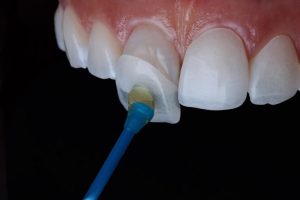Veneer Teeth Care: Prolonging Porcelain and Composite Veneers
When it comes to enhancing our smiles, many individuals opt for veneer teeth, whether crafted from porcelain or composite materials. However, once these pristine dental veneers are in place, maintaining their optimal appearance becomes a priority.
You might find yourself frequently searching for veneers near me online, seeking guidance on proper care. Alternatively, you may be uncertain about the specific care routine required for your type of veneer, or you might have noticed changes in your dental veneer and are seeking advice.
Don’t stress, as this blog post is here to assist you. We’ll explore the world of veneer teeth in a straightforward manner, offering valuable tips on ensuring their longevity. We’ll discuss daily practices that contribute to veneer care, along with dietary and lifestyle choices that can positively impact their condition. Our goal is to provide a comprehensive guide to maintaining the radiance and beauty of your dental veneers for years to come.
Porcelain Veneers vs. Composite Veneers: Know the Difference
Veneer teeth serve as a cosmetic dentistry solution tailored to enhance the visual appeal of your smile. These slender shells, crafted from either porcelain or composite materials, are custom designed to snugly fit over the frontal surface of your natural teeth.
The primary objective of veneers is to elevate the aesthetic aspects of your teeth, effectively addressing concerns such as discolouration, chips, gaps, or misalignments. Opting for porcelain veneers proves advantageous for those seeking a durable and stain-resistant choice, boasting a natural, tooth-like semblance. Renowned for their robustness, porcelain veneers can endure up to 15 years with proper maintenance. Conversely, composite veneers often present a more economical option, necessitating fewer dental appointments. Comprising a resin material, they offer repairability if damaged, a feature not shared by porcelain veneers. Nevertheless, their durability is comparatively lower, and they may not repel stains as effectively as their porcelain counterparts.
The decision between porcelain and composite veneers hinges on individual needs, budget considerations, and lifestyle preferences. Regardless of the type, veneer teeth can offer a significant boost to your confidence by giving you a brighter and more appealing smile. It’s important to remember that maintaining your veneers with proper care is crucial for their longevity.
Top Tips for Prolonging the Life of Your Dental Veneers
Essential Care Guidelines for Porcelain Veneers
Porcelain veneers consist of slim shells crafted from medical-grade ceramic, affixed to the front surfaces of teeth. To ensure their optimal care, consider the following:
- Effective Oral Hygiene: Uphold a consistent oral hygiene regimen by brushing twice daily and incorporating daily flossing into your routine.
- Regular Dentist Visits: Regular check-ups with your dentist are crucial. They can check the condition of your veneers and your overall oral health.
- Avoid Hard Foods: Avoid biting hard foods like nuts or ice with your veneers as they can crack.
- Wear Mouth Guard: If you grind your teeth at night (bruxism), consider wearing a mouth guard to protect your veneers.
- Avoid Staining Food and Drinks: While porcelain veneers are resistant to staining, the adhesive bonding them is not. Try to limit coffee, tea, red wine, and tobacco use.
- Use Specialised Toothpaste: Some toothpastes contain ingredients that can be too abrasive for veneers, causing them to look dull over time. Look for non-abrasive toothpastes designed for sensitive teeth or specifically for veneers.
- Invest in an Electric Toothbrush: Electric models can provide a more thorough clean than manual brushing. They can effectively remove plaque build-up and keep the gum line clean, which is important for maintaining the health of veneered teeth.
- Consider Whitening Treatments: While porcelain veneers themselves cannot be whitened, your natural teeth can discolour over time, causing a mismatch. Professional teeth whitening treatments can keep your natural teeth the same shade as your veneers.
- Antibacterial Mouthwash: Using an antibacterial mouthwash can help prevent gum disease and decay around your veneers.
Also Read: Affordable Dental Veneers at New Smiles Dental, Melbourne
How to Maintain Composite Veneers for Long-Term Durability
Crafted from a resin material, composite veneers offer a more budget-friendly alternative to porcelain counterparts. Here’s a guide on maintaining their care:
- Maintain Oral Hygiene: Brush and floss regularly. Use a toothpaste that is not too abrasive to avoid scratching the teeth veneers surface.
- Regular Polishing: Composite veneers can lose their shine over time. Regular professional polishing can help maintain their appearance.
- Use a Sealant: Ask your dentist about applying a sealant over your veneers. This can offer an additional layer of protection against stains and damage.
- Avoid Acidic Foods and Drinks: Acidic substances can wear down the composite resin. Try to avoid foods and drinks that are high in acid, like citrus fruits and soda.
- Limit Alcohol Consumption: Alcohol can soften the composite resin, making it more susceptible to damage. Try to limit your alcohol consumption.
- Protective Wax: If you have a habit of biting your nails or using your teeth to open packages, consider using a protective dental wax over your teeth veneers to prevent damage.
- Regular Check-ups: Regular visits to the dentist will help maintain the longevity of your composite veneers. Your dentist can polish them to keep them looking their best.
- Employ a Mouth Guard: Safeguard your veneers by wearing a mouth guard, especially if you tend to grind your teeth during the night.
Keep in mind that the most effective approach to caring for your veneers, be they porcelain or composite, involves consistently practising good oral hygiene and making regular visits to your dentist.
Dealing with Damage: What Happens if my Teeth Veneers Break?
Veneers, whether porcelain or composite, are not invincible and can sometimes break or chip. When this happens, the course of action largely depends on the extent of the damage and the type of veneer involved.
If you have a porcelain veneer that cracks or breaks, it typically requires total replacement for the affected tooth. This is because any crack or break in the veneer can lead to decay underneath, which could escalate into a much larger problem. It’s advisable to avoid biting into hard foods until you can see a dentist.
Conversely, when dealing with a fractured veneer crafted from a composite resin material, the possibility of repair hinges on the extent of the damage. For minor cracks or chips that have minimal impact on the veneer’s functionality, your dentist may successfully patch them.
Regardless of the material, if a veneer sustains damage, it’s crucial to promptly reach out to your dentist to schedule necessary repairs. Attempting a DIY fix with over-the-counter glue or similar products is not advisable. Although occurrences of veneers dislodging are exceedingly rare, if you encounter such an issue, seeking professional assistance without delay is paramount.
Regular Check-ups and Your Veneers: The Importance of Consistent Dental Visits
Regular dental visits play a critical role in maintaining the longevity and appearance of your veneers. These check-ups are not just about cleaning your teeth; they’re also an opportunity for your dentist to assess the condition of your veneers and ensure they’re still perfectly bonded to your teeth.
During these visits, your dentist can professionally clean and polish your veneers, helping them maintain their shine. They’ll also check for any signs of gum disease or tooth decay, which could undermine the health of your veneered teeth. Early detection can prevent severe damage and costly repairs.
For those with composite veneers, regular dental visits are even more important. Your dentist can re-polish composite veneers to keep them looking their best and apply sealant for added protection.
Plus, regular dental visits allow your dentist to spot any early signs of wear or damage that you may not have noticed. They can address minor chips or cracks before they become major issues, potentially saving your veneer and preventing further damage.
In conclusion, taking care of your veneers extends beyond good oral hygiene at home. It requires a commitment to regular dental check-ups and professional dental care. By investing in consistent dental visits, you’re not only protecting your financial investment in veneers but also ensuring a healthy, confident smile for years to come. Remember, veneers are an investment in your self-esteem and your social interactions, so give them the care they deserve.


